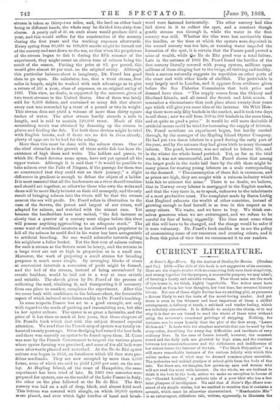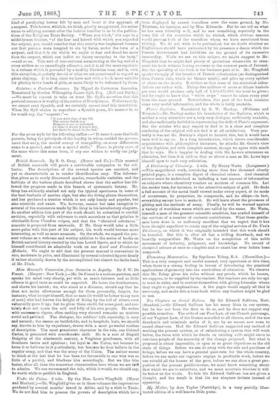CURRENT LITERATURE.
A Sister's Bye-Hours. By the Author of Studies for Stories. (Strahan and Co.) 1868.—The title of this book is not suggestive of its contents. Here are six simple stories with no connecting link save their simplicity, and strung together for the purpose, a reasonable purpose, we may admit, of forming a handy and saleable volume. That these tales are the work of bye-hours is, we think, highly improbable. The writer must have bestowed on them her best thoughts, her best time, her severest literary labour. Not one of these slight fictions has an exciting plot, or possesses a flavour likely to suit the taste of the novel-loving reader. And yet there is even in the thinnest and least important of them a skilful arrangement, a delicacy of touch, a subdued and tender feeling, which are infinitely attractive. It is difficult to analyze the charm, or to say why it is that we are forced to read the whole of these tales without using the reviewer's occasional privilege of skipping. Nothing, for instance, can be more homely than the plot of the first story, "Laura Richmond." It deals with the simplest materials that can be used by the story-teller, describing the every-day difficulties and incidents of very ordinary lives. In the case of Laura herself, however, the common round and the daily task are glorified by high aims, and the contrast between her conscientiousness and the selfishness and indifference of her sisters forms the interest of the tale. "The Black Polyanthus" is a still more remarkable instance of the carious felicity with which this writer makes use of what may be deemed common-place materials. The jealousies and unkind grudges of school-girls form the body of the tale. Yet there are, we imagine, few grown-up men and women who will not read the story with interest. On the whole, we are inclined to think it the best in the book, unless we make an exception in favour of the "Clouded Intellect," a pathetic tale of a poor idiot who has a few faint glimpses of intelligence. We said that A Sister's Bye-Hours con- sisted of six simple stories, but we omitted to mention that it contains a seventh, which most be otherwise characterized. " Maschaehito MD" is an extravagant, ridiculous tale, written, apparently, to illustrate the
kind of paralyzing horror felt by man and beast at the approach of a serpent. This horror, which is, we think, greatly exaggerated, the writer tarns to edifying account after the fashion familiar to us in the publica- tions of the Religious Tract Society. "When you think," she says to a midshipman brother, "of the fear and hatred with which you regarded the serpent, you should consider that this enmity was implanted because our first parents were tempted to sin by Satan, under the form of a serpent, and that it is sin which we ought to fear and dread far more than the serpent, which can inflict no injury excepting to the body," —and so on. This sort of conventional sermonizing at the fag end of a story strikes us as exceedingly offensive, and it is all the more repulsive in a volume which is pervaded by a healthy Christian tone, and is, with this exception, singularly devoid of what we are accustomed to regard as pions claptrap. It is long since we have met with a book more suitable for placing in the hands of girls, or more likely to be welcomed by them.



































 Previous page
Previous page